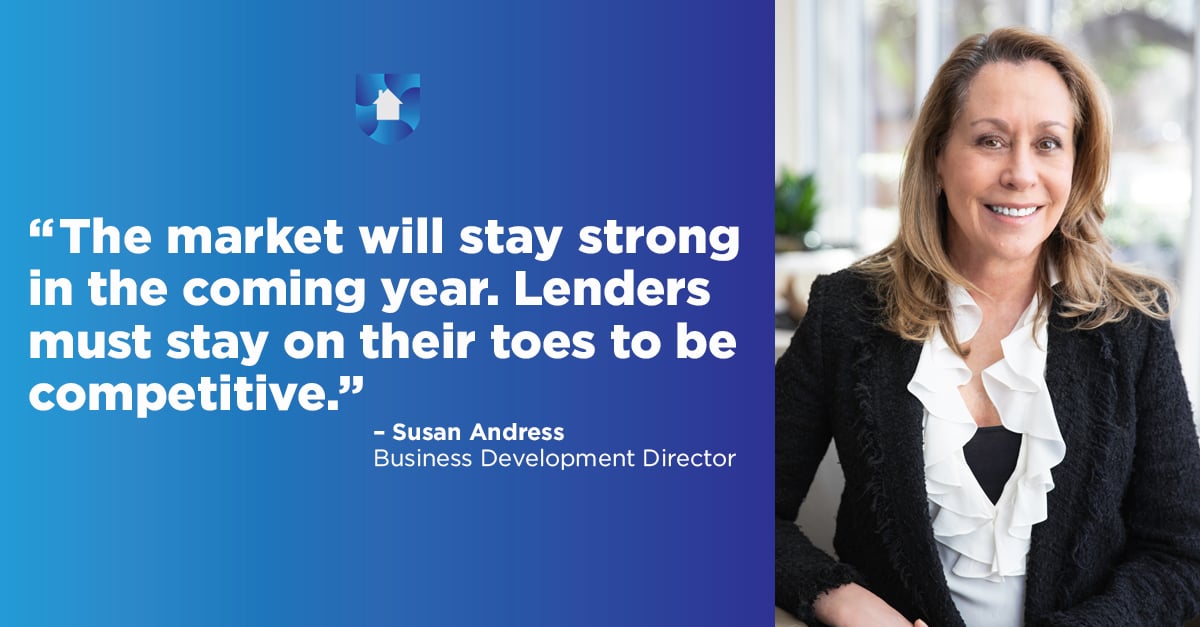Networking is an essential skill for success in any industry. For house flippers, it can open doors to new opportunities, partnerships, and perspectives that can help you scale your business. (Even when interest rates are high!) Business cards and social media groups are a good start – but the following underused strategies will give you an edge over the competition.
Topics: Fix-and-Flip Financing Tips, Fix-and-Flip Lenders, Property Investment Strategies, real estate investing
Questions to ask when choosing a rental property loan
Demand for affordable housing remains high, which is good news for single-family real estate investors across America. As the single-family rental (SFR) industry continues to mature and become more institutional across the board, many investors are opting to keep their flips as rental properties.
The steps to fix-and-flip and fix-and-hold are similar, but there are important things to consider as you build a rental portfolio. You’ll want to answer some strategic questions on your journey to building long-term wealth.
Should I Choose a Fixed or Adjustable Rate?
After nine consecutive rate hikes by the Federal Reserve since March 2022 and a Fed Funds rate over 5%, every investor in America is acutely aware of interest rates and the impact they can have on their investment. For the SFR investor looking for the right financing solution for a rental property, there are two options: a mid-term or long-term approach.
The mid-term solution comes in the form of a 5, 7, or 10-year interest-only, adjustable-rate mortgage (ARM). The benefits of a mid-term solution are two-fold: 1.) You only pay interest on the principal balance of the loan, which means cashflow is higher than that of a fully amortizing loan, and 2.) You have a window of time to assess long-term interest rates and plan for the day when you ultimately lock in a long-term 15 or 30-year financing solution. The risk of an ARM is that long-term interest rates move higher than your existing interest rate during the 5, 7 or 10-year window and you get stuck in a negative leverage situation.
The long-term solution comes in the form of a 15 or 30-year fully amortizing, fixed rate mortgage. The benefits of the long-term solution are also two-fold: 1.) You have certainty of what your mortgage payment will be over the long-term, regardless of what happens in the interest rate market, and 2.) At the end of the financing period, the asset will be free and clear of all debt while still providing a steady stream of cashflow. The downside of a long-term solution is that these mortgages typically come with hefty pre-payment penalties over the first five years of the mortgage period, which makes it more costly if you want to refinance the asset as/if long-term interest rates move down during that five-year period.
Topics: Fix-and-Flip Financing Tips, Fix-and-Flip Lenders, Property Investment Strategies, real estate investing
Beware the down (down payment, that is!)
Down payments are typical in private lending. Real estate investors usually accept down payments as a necessary part of financing their rehab, focusing instead on finding the lowest rate. But your down payment has a huge impact on your business. Down payments leave you cash poor in a cash intensive game.
Topics: Fix-and-Flip Financing Tips, real estate investing, Private Money Lenders
What Fix-And-Flip Loan Terms Really Mean
The terms of fix-and-flip private loans can differ from lender to lender, and sometimes even deal to deal. (Sadly, the bait-and-switch method still lives on in private lending. Luckily, our terms never change.) It’s a frustrating task to try and create an apples-to-apples comparison of loan terms, which is why sometimes investors eschew much of the information about their loans to focus on a single element: interest rate. But interest rates are only one influencing factor in the overall cost and quality of your loan. It’s mission-critical to understand each line item of your terms and know exactly how much you’ll have to bring with you on closing day (ideally… as little as possible!).
To understand the big picture, let’s unpack the most common terms written into a fix-and-flip private loan, and their impact on your ROI.
Amount Funded
It’s always a good day to get a check in the mail (or transfer to your account) from your rental properties. Your net cash flow is the money you get from your tenants, minus expenses and your loan payment.
Example: You purchase a $120,000 rental home. Tenants pay you $1,200 monthly. If your expenses and loan are $1,100, your net cash flow on a monthly basis is $100. Granted, $1,200 a year isn’t a large chunk of change. It’s more like the cherry on top of the other ways rental properties make you money. Compare it to the dividend of a stock; it’s likely not your primary reason for the investment, but it sure doesn’t hurt.
Related: Learn tips and tricks on calculating ARV from Michael Blatney, Portfolio Underwriting Manager.
Topics: Fix-and-Flip Financing Tips, Fix-and-Flip Lenders, Property Investment Strategies, real estate investing
What to Know About Your Private Lender
Does this scenario sound familiar?
You find an amazing investment property. Your heart is set on it. You scramble to find a private lender to close the deal—and things fall apart. Perhaps the lender denies you because it’s not one of their target markets. Or you can’t get them on the phone and another investor beats you to the punch. Or maybe—most infuriatingly—a Wall Street market turn makes your lender lose confidence and you’re left at the closing table without a closed deal wondering…. where did I go wrong?
There’s only one way to prevent every one of these scenarios: begin with the end in mind. (This is also one of Stephen Covey’s seven habits of highly effective people.) Select your lender before you look for properties, and do so with scrutiny. Choosing your lender first allows you to position your dominos so you can knock them all down, flawlessly, on closing day.
There are numerous private lenders out there. So how do you begin to compare? Ask the following questions, and the right relationship will become apparent:
Here are some things to consider when budgeting to flip vs. hold.
What is your private lender’s source of capital?
Few investors pay much mind to where their lender’s cash comes from. But you should, because many private lenders are backed by Wall Street sources of capital. So when the capital markets are all up and to the right, these private lenders close a high number of deals. But when the winds of Wall Street change—which they do from time to time—they cancel deals, alter terms or close up shop until the wind blows over leaving you, the investor, stranded.
Look for a private lender that uses their own money: a balance sheet lender. Residential Capital Partners is a balance sheet lender that controls its own destiny as well as yours through use of its own capital on each closed deal. That’s how we thrived during the 2008 housing crisis and throughout the 2020 pandemic. We approved countless deals for investors whose initial lender changed the terms of the deal at the closing table or flat out walked away from the closing table during a bear market.
Topics: Fix-and-Flip Financing Tips, Fix-and-Flip Lenders, Investment Property Strategies, Private Money Lenders
How to Foolproof your Fix-and-Flip: Consider Market Climate and Start Smart Investing
Now that we’re less than half a year away from 2022, what do we know so far about 2021? In the last year alone, median values of single-family homes and condos rose more than 10% nationally. This rising surge of new house hunters and a super tight supply of housing inventory was also impacted by an ongoing pandemic. With mortgage rates remarkably low, home buying became an attractive option for many Americans seeking more space, a second home, or a work-from-home office with a better view.
SLIGHT DIP OR REAL DOWNTURN?
Now, halfway into the 10th year in this housing boom, many home investors wonder: will real estate markets flatline or drop? How long will these high prices last? While we can’t see into the future, we have some new data about how 2021 compares so far to prior years, both before and since the housing boom. According to a report from ATTOM, fix-and-flip real estate investments have fallen to the lowest level since 2000. In the first quarter of 2021, the same report cites only one in 37 transactions, or only 2.7% of home sales, were flips. Compare that figure to where we were in the first quarter of 2020: down from 7.5%, or one in 13 sales were categorized as fix-and-flips.
Topics: Fix-and-Flip Financing Tips, House Flipping Market Insights, Housing Market Trends
3 Ways to Get Fix-and-Flip Funding
Flipping a house requires money – lots of money. Beyond the purchase price, single-family investors must come out of pocket for legal fees, appraisal fees, title costs, closing costs, home inspections, rehab costs and disposition costs. In a Seller’s market, these costs have a tendency to go the way of home appreciation…up, up, up and away. Given the median purchase price for existing homes in June 2020 of $295,300, these numbers add up fast especially when you are doing more than one flip investment at a time.
Whether you are flipping one, two, or dozens of houses per year: maintaining adequate cash reserves is critical to keeping your operation up-and-running, so that you can realize the back end profits associated with your investment. As they say…cash is king!
That is why so many single-family investors look for a financing partner to fund their fix-and-flip investment properties. Having more cash on hand gives you, the investor, flexibility in a dynamic market whether that means more cash to realize an unexpected opportunity, more cash to negotiate a better deal with a faster close or more cash to give you peace of mind through the investment cycle. Knowing which available financing options will give you the most flexibility as an investor is the key.
Flip vs Flop: How To Sell in a Seller's Market
Your inbox: it’s overflowing. Your desk: it’s piled high. Your mind: it’s scattered, to say the least.
A seller’s market can be a godsend when you’ve just rehabbed a promising fix-and-flip property. But when a seller’s market brings you a high volume of offers, things can get complicated fast. Overwhelmed by your good luck, you may be tempted to simply select the highest offer from the stack.
Don’t. Competition breeds excellence. Use the forces at play in the market to your advantage. Borrowers may lie to you. Markets never will.
Follow these negotiation best practices:
1. Highest and Best Offer
If you are staring at a stack of offers on your rehabbed property, then you have done something right. Now, take your game to the next level. Study the offers that have come in comparing price, closing timeframe, conditions to close, etc., and use the best terms of each offer to outline what would be your perfect offer from the perfect buyer. Pick the 3 to 5 of the strongest buyers that:
- Have the best price and terms.
- Have the most experience.
- Have the strongest proof of funds letter or balance sheet presentation.
Call these buyers and tell them they have been hand selected out of many to sharpen their initial offer into a Highest and Best Offer. Tell them they have until 5:00 PM to get their final offer to you. Tell them you will call them by 6:00 PM to inform them if they won or lost. If they ask, have your “perfect offer” list by your side to give them a hint of where they need to improve. And then, go enjoy your day until the clock strikes 5:00 PM.
Topics: Fix-and-Flip Financing Tips, House Flipping Market Insights, Housing Market Trends
Defer Taxes—Not Profits—With a 1031 Exchange
The purpose of flipping houses — or any property — is to realize a profit. Period. From the minute you secure a property with a hard money loan, your focus is turning your property into a tidy profit that you can take to the bank.
Novice flippers normally have their eyes on this prize. They have worked hard to find the right property. They’ve successfully rehabbed and sold a property or two. They’ve developed relationships in the business from sound contractors to hard money lenders, both of whom can move swiftly at their direction to help them realize their goal – profits and more of them.
But once a novice flipper begins moving up the scale of their craft, their eyes naturally drift to more sophisticated ways to realize and protect their profits as they wield their trade. One of these handy tools of sophistication is the 1031 Exchange.
What Is a Section 1031 Exchange?
Section 1031 is an IRS code that allows you to defer paying capital gains on an investment property if you do a “like-kind” exchange of one property for another.
For example, let’s say you buy a property for $100,000, improve it, and the value rises to $200,000. If you simply sell, you’ll be taxed on your gain at your ordinary income level. But if you trade the property for another property of like value, you can defer your taxes until you sell the exchanged property.
The Rehab to Rental Strategy
The novice turned proficient or expert rehab professional can take the opportunity to turn the 1031 Exchange example above into a powerful wealth building strategy. Upon selling the improved property for $200,000, the rehab professional will immediately begin looking for a property of like-kind or similar value to trade into in order to avoid paying ordinary income tax rates on the gain from sale.
Topics: Fix-and-Flip Financing Tips
5 Ways to Minimize Taxes on Fix and Flips
When you take out a hard money loan, bridge loan or investment property loan to buy a flip, you do it with one goal in mind: to make a profit.
In the process of your rehab, many factors will conspire to eat into your profits. Weather. Time. Unreliable vendors. The list goes on. But, few things eat away as much of your profits as taxes; the more you make, the more you pay.
One of the most effective ways to protect your profit margin is to find legal ways to minimize your taxes. We’ve identified five proven ways to minimize your tax exposure – so you can keep more of the money that you’ve worked so hard for.
1. Maximize Your Deductions
You’re fully aware that drywall, flooring, tile, paint and other hard costs are tax-deductible. So are outside labor costs. But don’t stop there.
Do you have a home office? Do you drive your car to and from the project site? Does that car use gas? Will you be paying any closing costs when you sell? Did you pay interest from a hard money or bridge loan?
Not all of your deductions are related to the renovation. Broaden your scope and see all the costs that go into your flip. Then, make all the deductions you’re entitled to.
One pro tip: Open a dedicated checking account and/or credit card specifically for deductible expenses. At the end of the year, you’ll have one simple report that organizes everything for you.
Topics: Fix-and-Flip Financing Tips, House Flipping Market Insights
Struggling To Differentiate Your Fix-And-Flip Program?
You’re not alone. Nearly one year ago, lenders across the United States froze their fix-and-flip lending programs in response to the COVID-19 pandemic. Today, the market is strong and a resurgence of programs abounds—with one pesky problem: they’re nearly all the same.
Susan Andress is the Business Development Director for Residential Capital Partners’ Correspondent Lending Program. In this role, she’s heard the stories of many lenders facing this conundrum first-hand and helped them make their programs more competitive by using Residential Capital Partners’ platform.
Download the Fix & Flip Correspondent Lending Program Highlights to learn more about our 100% fix-and-flip lending program.
Blazing fast approvals.
The market is hot. Turn-around time is critical. Andress says, “The greatest value I can offer my correspondent is responsiveness and speed in underwriting and closing. We’ve made it a very tight process. Lenders will ask me: ‘How quickly can you close?’ and, I say: ‘As soon as you provide us with a complete file!’”
Residential Capital Partners’ program has an edge thanks to their relationships across the nation. Andress reports, “We have an exhaustive list of appraisers in every market which helps the turn-time on every deal. We also have two dedicated people monitoring the underwriting and approval process.”
Residential Capital Partners has also streamlined the process by providing proof of funds letters to approved borrowers. These letters help borrowers secure a contract from weary sellers trying to pick the right buyer.
ARV Doesn’t Affect Your Bottom Line. It IS Your Bottom Line.
Correctly calculating ARV (After Repair Value) is no cakewalk. The market changes daily – by city, neighborhood, and street. To be a great ARV calculator, you must be equal parts historian, detective, and fortune teller. Perhaps Zen master, too, because the stakes are high: calculating ARV incorrectly can literally cost you hundreds of thousands of dollars.
ARV, by its nature, is a moving target, and most fix-and-flippers never hit a bullseye. Yet, Michael Blatney, Residential Capital Partners’ dedicated Portfolio Underwriting Manager, is one of the industry’s sharpest shooters. Why? Because he’s been flipping houses since before there was a name for it – and more or less discovered the concept of an ARV.
Make your next property walkthrough a breeze.
So, if you want to turn a profit flipping houses in 2021, when the market is tight and inventory is low, keep reading and heed his advice.
















